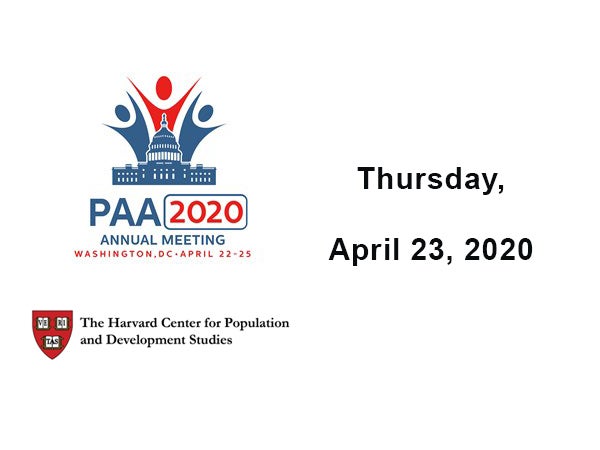The 2020 PAA annual meeting has gone virtual. Today, there are two live sessions (both from 1:00–2:30 EST) that include Harvard Pop Center faculty member Alexandra Killewald (FLASH: Determinants of the Gender Pay Gap) and several speakers formerly associated with the Center including Xiana Bueno, Mahesh Karra, Eunsil Oh and Jocelyn Finlay (Flash: Politics and Policy Surrounding Fertility, Family Planning, Sexual Behavior, and Reproductive Health). Check out the schedule of…
What is widening the racial and ethnic wealth gaps during young and middle adulthood in the United States?
Harvard Pop Center faculty member Alexandra Killewald, PhD, and Graduate Student Affiliate Brielle Bryan have authored a paper published in Social Forces that applies a life-course perspective to wealth accumulation, examining both the inherited disadvantage of previous generations, along with current inequities in factors such as education, income, marital status, and home ownership.
Pop Center faculty members Killewald and Pager named as Radcliffe Institute Fellows
Congratulations to Harvard sociologists Alexandra Killewald and Devah Pager who will be joining the 2017-2018 cohort of incoming Radcliffe Institute Fellows.
Alexandra Killewald on WGBH Innovation Hub about What Inequality Looks Like Now
Harvard Pop Center faculty member and sociologist Alexandra Killewald, PhD, speaks about the difference between income equality and wealth inequality in this podcast on WGBH Innovation Hub.
Risk of divorce tied to division of labor
A new study published in the American Sociological Review by Harvard Pop Center’s faculty member Alexandra Killewald, PhD, suggests that division of labor may have more to do with predicting a couple’s risk of divorce than the money or material aspects of a marriage. In couples who wed after 1975, husbands who were not employed full-time faced a slightly higher chance of divorce. Learn more from livescience, CTV, AJC, lifezette.com, and Philly.com.
Could Killewald’s research on marriage premium make Millennials less adverse to tying the knot?
In response to a news item in The Washington Post on the trend amongst Millennials to avoid, or at least postpone, getting married, a piece on MercatorNet refers to Killewald’s research on the marriage premium, the wage increase that tends to occur for both men and women after getting married.
Killewald on “tethered autonomy”
A new paper by Alexandra Killewald uses the term “tethered autonomy” to describe post-parenthood changes in partners’ housework hours, paid work hours, occupation traits, and wages. Killewald found that variation across American couples in work responses to parenthood is shaped primarily by variation in wives’ adjustments, while husbands’ work acts largely as a fixed point. The paper was published in Social Science Research.
Killewald explores whether motherhood penalty is necessarily larger for low-wage women
Harvard Pop Center affiliated faculty member Alexandra Killewald, PhD, Assistant Professor of Sociology at Harvard University, challenges the conclusion of Budig and Hodges (2010) that the motherhood penalty is larger for low-wage women by using an unconditional versus a conditional quantile regression model in a recently published study.
